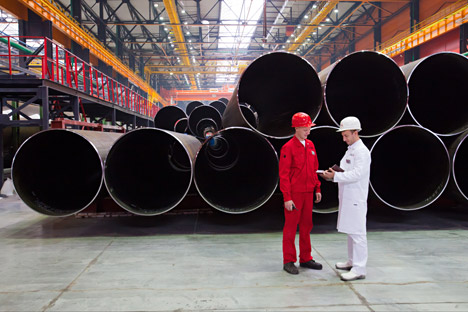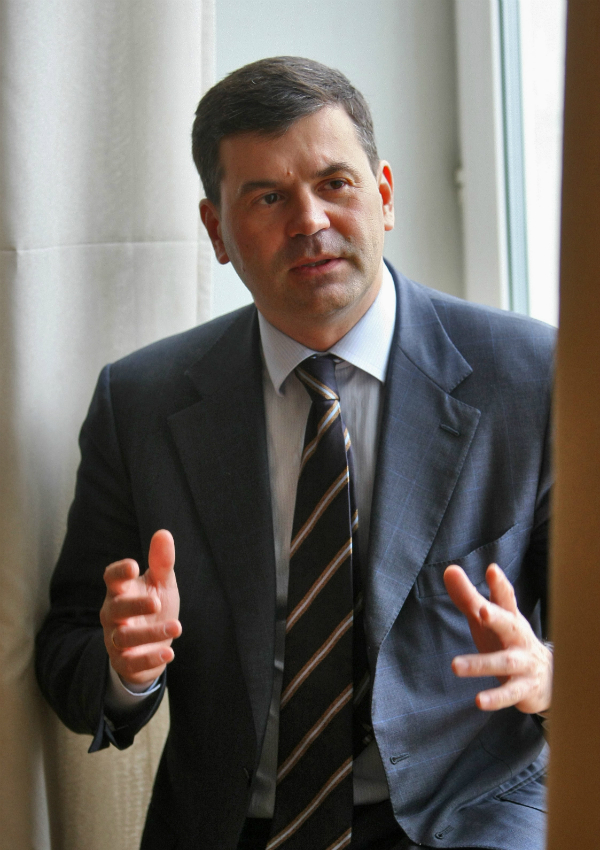Russia extends credit to new businesses

Racked by recession and Western sanctions, Russia is seeking new methods for spurring the development of new businesses, including state-backed credit. Source: ITAR-TASS
RBTH: The most recent investment forum in Sochi mostly featured Russian players. Can we talk about the isolation of Russia and how dangerous that is in terms of technology?
The Sochi forum has always been focused more on internal regional policy, but there have been foreign participants as well. I am convinced that cooperation with other countries is important and necessary for Russia. The Russian economy cannot develop in a vacuum, particularly in the area of innovation.
For instance, our fund has a variety of projects, including some examples of successful cooperation between Russian and Western businesses. For example, the Kostroma automotive components plant produces pistons for car engines in cooperation with a German engineering company, and they will be used by both Russian and foreign automakers who have localized production in Russia and the CIS, including Volkswagen, Renault, Nissan, Ford and others.
One of the best and fastest ways to develop the economy is to attract companies that have already achieved something in the world. As for technology start-ups, there can be no doubt at all about the need for international relations. Innovation can only be global.
 Alexei Komissarov. Source: Kommersant
Alexei Komissarov. Source: Kommersant
RBTH: Do you fund projects only at an early stage?
Not necessarily. The fund was created to solve the problem of obtaining financing when creating new or expanding existing production, but we are not talking about seed or even preseed funding. We are considering projects from existing companies with clear sales markets and customers, where the price is clear and the risk is minimal; that is, we are not talking about venture capital investment.
The aim of the fund is to help fund financing in three stages when banks do not give loans: pilot-plant stage, design work, engineering, etc. Our fund provides them with debt financing at 5% per year in rubles for a period of 5-7 years and for 700 million rubles.
RBTH: The informal mission of the organization is to support projects that cannot be realized without such funds. Do you have any priority sectors that you support?
No, our principled position is that we are not limited to a specific industry or region, but we try to focus on the support of medium-sized manufacturing businesses. Small businesses do not often go to the manufacturing sector, while large businesses can find other sources of funding. As of mid-October, we have supported 47 projects for 16.5 billion rubles in industries such as pharmaceuticals, electronics, mechanical engineering, chemistry, biotechnology and production of new materials.
RBTH: Do you ask for any guarantees in exchange for a loan?
We do not enter into the share capital of the company, we only give a loan for the development on favorable terms, and we are strongly against any grant funding programs for industry. As any lender, we want to be sure that our money is returned. We basically work only with financially stable companies, and the condition for obtaining a soft loan is to provide security for the entire amount.
RBTH: How do you select projects for funding?
In the first stage, we consider an application for compliance with the formal requirements and give an answer literally within five days. Then we carry out production and technological as well as financial and legal expert analyses.
Then the advisory council, which consists of representatives of business and banks, takes the final decision. In doing so, it relies on very clear demands.
There are three important conditions. First, the Fund’s loans should not violate the competitive environment — that is, the applicant company must produce a product which has no analogues in Russia, and therefore there is no competition. Secondly, what is important to us is the feasibility of the project, and, thirdly, the export potential of the project.
RBTH: Are there examples of international cooperation?
We have a lot of projects that cannot be called “innovative” from a global point of view, but for the Russian market, they represent the most advanced developments and high-tech production.
However, we have some world-class innovative products. For example, one of the projects supported by us is the creation of a domestic processor, which is already being exported to Germany.
All rights reserved by Rossiyskaya Gazeta.
Subscribe
to our newsletter!
Get the week's best stories straight to your inbox